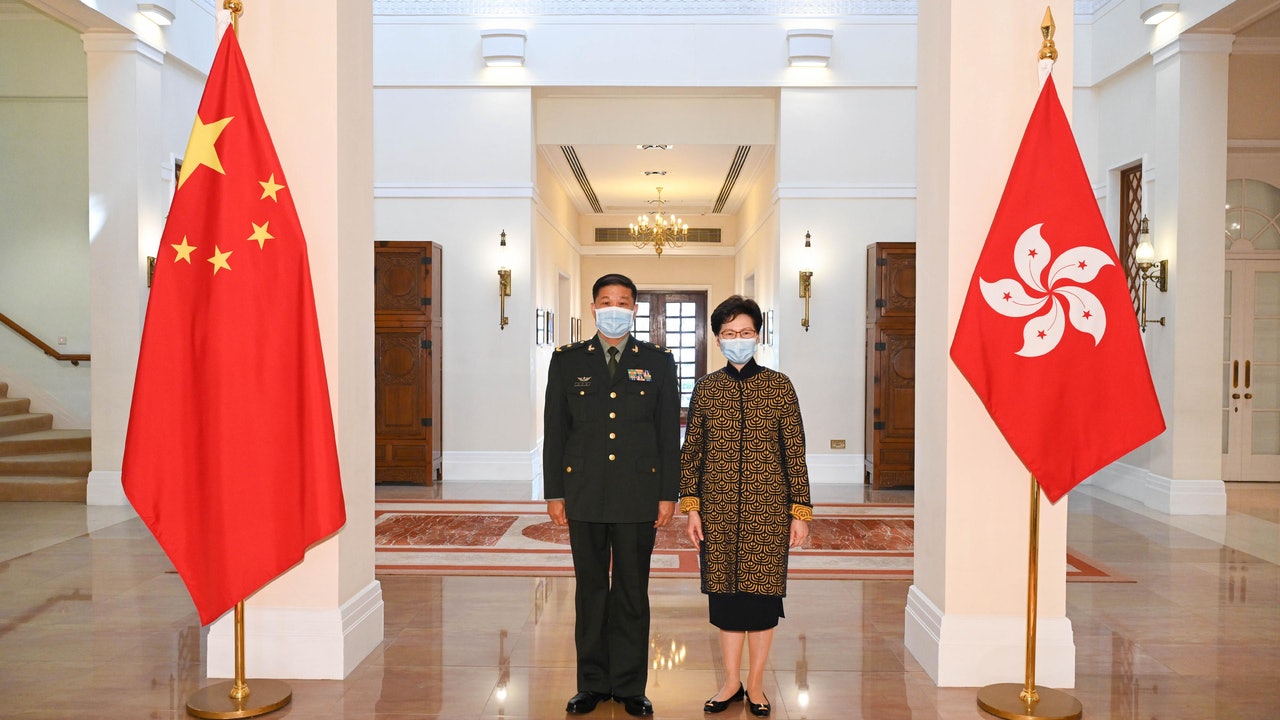Recently, Xi Jinping, chairman of the Central Military Commission, signed an order to appoint Major General Peng Jingtang, deputy chief of staff of the Armed Police Force, as the commander of the Chinese People's Liberation Army Garrison in Hong Kong, and the commander of the Southern Theater Command, General Wang Xiubin, announced the appointment a few days ago.
This is the first time that the armed police force, especially a person with anti-terrorism experience, has served as the commander of the People's Liberation Army in Hong Kong.
The Hong Kong Garrison released news on Peng Jingtang's appointment on Sunday (9th), Peng Jingtang said: "Together with all officers and soldiers of the garrison, we will resolutely follow the command of the Party Central Committee, the Central Military Commission and Chairman Xi, fully implement the 'one country, two systems' policy, perform defense duties in accordance with the law, and resolutely Defend national sovereignty, security and development interests, and firmly safeguard Hong Kong's long-term prosperity, stability and long-term stability."
Chief Executive Carrie Lam met with Major General Peng at Government House on Monday (10th).
She pointed out that the Hong Kong Garrison, as a symbol of national sovereignty, has always performed its duties in the Hong Kong SAR in strict accordance with the Basic Law, the Garrison Law of the Hong Kong Special Administrative Region of the People's Republic of China and relevant laws, and is a solid backing to ensure the long-term prosperity and stability of the SAR.
Peng Jingtang was the chief of staff of the Xinjiang Armed Police Corps
According to public information, Peng Jingtang served as the brigade commander of a brigade of the Jinan Military Region of the Chinese People's Liberation Army, the head of the Military Training Department of the Jinan Military Region Command of the Chinese People's Liberation Army, the chief of staff of the Xinjiang Armed Police Corps, and the deputy chief of staff of the Armed Police Force.
On July 29, 2018, the Armed Police Force held a ceremony to promote the ranks of lieutenant general and major general. Peng Jingtang, chief of staff of the Xinjiang Corps, was promoted to the rank of major general.
Chief Executive Carrie Lam Cheng Yuet-ngor (right) met with Major General Peng Jingtang (left), Commander of the Hong Kong Garrison of the Chinese People's Liberation Army, at Government House on Monday (January 10).
The Xinjiang Armed Police Corps has attracted much attention because of the "Shanying" commando.
Reference News published a signed article on August 20, 2019, "The "Shanying" commando is here!
The Armed Police’s Anti-Terrorism Special Warfare Adds New Members”, which stated, “This new anti-terrorism special war force, which has never appeared in the public eye, was formed not long ago. It was in the context of military reform, in order to meet the needs of Xinjiang and even the country’s anti-terrorism tasks. The report also quoted the introduction of Peng Jingtang, the then chief of staff of the Xinjiang Armed Police Corps, "In terms of ammunition consumption, only one unit of the "Shanying" commando unit consumed the same amount of ammunition last year as other units in the first three years. The total consumption of ammunition before August this year has far exceeded that of the whole year of last year."
Peng Jingtang's unprecedented move from deputy chief of staff of the armed police to Hong Kong sent at least three major signals:
First of all, the situation in Hong Kong has not been settled with the finalization of the "Hong Kong version of the National Security Law".
Under the pressure of the turmoil over the amendments in 2019
,
Beijing launched the "Hong Kong version of the National Security Law" by means of thunder, and followed it with the reform of the electoral system. Although the turmoil of the amendments has stopped violence and chaos, Hong Kong is also moving towards It is moving forward in the direction of chaotic transformation of governance, from governance to prosperity, but for Beijing, the finalization of the National Security Law will not necessarily bring Hong Kong’s prosperity, stability and long-term stability. It is also necessary to further prevent Hong Kong from becoming a base against the mainland and strictly guard against the Hong Kong version. Color revolution.
This time, Peng Jingtang, who has senior anti-terrorism experience, is serving as the commander of the People's Liberation Army in Hong Kong. It is not only a deterrent, but also a prevention under the bottom line thinking.
But note that the rule of law in Hong Kong is still Beijing's general approach to Hong Kong, and the People's Liberation Army in Hong Kong will not be easily dispatched at any time.
The PLA Hong Kong Garrison is a combined naval, land and air force.
(Getty)
Hong Kong must integrate into the overall national security interests
Second, Hong Kong needs to be integrated into the overall national development as well as the overall national security interests in the new era.
According to the "Garrison Law of the Hong Kong Special Administrative Region of the People's Republic of China", the People's Liberation Army in Hong Kong undertakes the following defense responsibilities: preventing and resisting aggression and safeguarding the security of the Hong Kong Special Administrative Region; undertaking defense services; managing military facilities; and undertaking relevant foreign-related military affairs.
In addition to these four responsibilities, based on the needs of national security interests in the new era, the People's Liberation Army in Hong Kong also needs to keep pace with the times and assume greater responsibilities in safeguarding national sovereignty, security and development interests.
This is why Peng Jingtang, after serving as the commander of the People's Liberation Army in Hong Kong, not only emphasized "performing defense duties in accordance with the law", but also expressed the need to "resolutely defend national sovereignty, security, and development interests, and firmly safeguard Hong Kong's long-term prosperity, stability and long-term stability."
In the end, in order to completely put things right, Beijing's personnel arrangements for Hong Kong are eclectic.
As mentioned above, since the establishment and stationing of the Hong Kong Garrison, Peng Jingtang is the first commander who has experience in the armed police force, especially in counter-terrorism, among the commanders of the People's Liberation Army in Hong Kong.
This is not only in response to the needs of the next situation in Hong Kong, but also reflects Beijing's flexibility in personnel arrangements for Hong Kong.
Such eclectic reduction of talents is also prominently reflected in the arrangements of Xia Baolong, director of the Hong Kong and Macau Affairs Office, and Luo Huining, director of the Liaison Office of the Central People's Government, during the turmoil of the amendment bill.
With the approaching of the 20th National Congress of the Communist Party of China, the personnel arrangement in Hong Kong will also continue this idea of employment, in order to completely put things right and realize the stable and long-term implementation of "one country, two systems".



/cloudfront-eu-central-1.images.arcpublishing.com/prisa/3I74UEXLYRBBRPGPSGWNN6WXH4.jpg)



